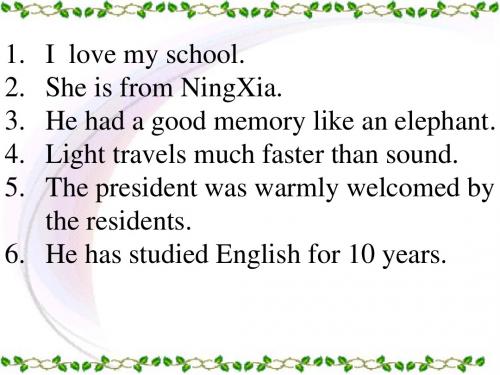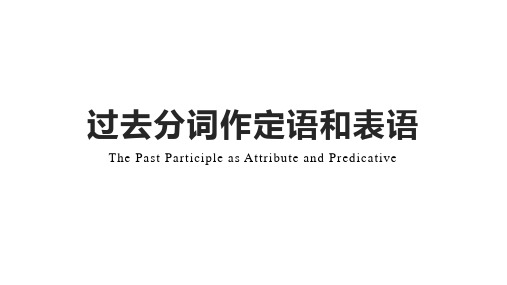高二英语知识点:过去分词做定语表语
alisama高二_过去分词做定语和表语课件

that/which _____ was 1) I love the book __________ written by GuoJingming. that is 2) The programme_______ hosted by TianTian brothers is popular
谓语动词 非
Nonfinite Verb
V-ing form past participle
infinitive
非谓语动词功能表
主 To d o V- i n g V-ed 语 宾 语 定 语 表 语 补 语 状 语
(the Past Participle as the Attribute & Predicative )
2. Have you noticed the bridge built last year? = Have you noticed the bridge which is being built there? ___________________
结论 过去分词作后置定语,表示被动 /或完成意义。
disappointed 3. She looked ______________when she heard disappointing news. (disappoint) the_______________ 4.He was encouraged _________________ by the encouraging __________________speech. (encourage)
2.表状态的一些过去分词:有些过去 分词因来源于系表结构,作状语时不 表被动而表主动。
lost ; seated ; hidden ; lost / absorbed in ;born ; dressed in ; tired of 。 Eg.飞机着陆的时候乘客要保持就座的状态。
过去分词作定语及表语新

过去分词作定语和表语一.过去分词构成及意义:A watched pot never boils. 心急锅不开①There only seemed to be powders designed to kilt snakes.②I placed the frozen bowl over the snakes’ habitat.③The criteria are so strict that it is difficult to get new ideas.过去分词短语:可以带有自己的宾语或被状语修饰。
过去分词的否定式:not /never+v-ed过去分词的意义:一般表示完成和被动的动作。
补充:1. Given more time, I could have done it better.1及物动词的-ed形式通常带有被动完成意义或被动一般意义。
2. We should bring in advanced technology from developed countries.②不及物动词的-ed形式仅表示完成意义,没有被动含义。
•过去分词作定语、表语、宾语补足语的功能:(一)、.过去分词做定语:1.前置定语:单个过去分词后置定语:过去分词短语①The lost time can never be found again.②Is there anything planned for tonight.that are planned for tonight.注:有时表强调或left等单个动词-ed也能后置①The book left(剩余的书)are for my students.②Among those invited(被邀请的人)were some ladies.Young people brought up in the new society can’t imagine the bitter life in the old days.作定语时可用定语从句代替He is a respected leader.= He is a leader__________________.Young people brought up in the new society can’t imagine the bitter life in the old days. = Yong people ______________________________________can’t imagine the bitter life in the old days.口诀:分词做定语的位置“定分”位置有二条,词前词后定分晓。
新高考英语语法名师点睛:过去分词作定语和表语三要素

名师点睛:过去分词作定语和表语三要素过去分词作表语和定语是非谓语动词重要内容之一,也是高考重要考点,学习时应注意下列几点:一、理清过去分词作表语和定语的最基本特点过去分词作表语和定语常常表示被动的和完成的动作。
He used to belong to the exploited class. 过去他属于被剥削阶级。
The polluted river gives off a terrible smell. 这条被污染的河发出臭味。
典型考例:1. Don't use words, expressions, or phrases ________ only to people with specific knowledge.A. being knownB. having been knownC. to be knownD. known析:D。
此处并不是强调进行的、完成的或将来的动作,因此应填过去分词known 作定语。
2. The first textbooks ________ for teaching English as a foreign language came out in the 16th century.A. having writtenB. to be writtenC. being writtenD. written析:D。
第一批课本是被写的,所以应填过去分词written作定语,表示完成的、被动的动作。
值得注意的是,有些过去分词(词组)因来自系表结构而不含被动色彩,如dressed like, dressed in, satisfied with, devoted to, tired of, born in, seated, pleased with, interested in, surprised at, prepared for, lost /absorbed in等。
过去分词作定语、表语、宾语补足语、状语精讲

过去分词作定语、表语、宾语补足语、状语精讲过去分词作定语、表语和宾语补足语作用与用法过去分词:表示完成和被动的动作,具有形容词.副词的作用主要形式:done,have done, had done可作成分:定语,表语,宾语补足语和状语1.定语: 表示分词的动作与所修饰的名词之间存在被动关系,或指一个动作的完成。
1)单一过去分词做定语——被修饰的名词之前(除了不定代词something, everything, anything, nothing, somebody, nobody ,those... )E.g. It was the lost cat.=It was the cat which had lost.Nothing reported ( in the newspaper) interested him.2)过去分词短语作定语——被修饰的名词之后单个过去分词及过去分词短语作定语均可以转换为一个定语从句E.g. People addicted to drugs are dangerous.=People who are addicted to drugs are dangerous.This is a novel written by Luxun.=This is a novel which is written byLuxun.【点拨】过去分词和与其相关的名词、代词之间构成一种"动宾关系",即"被动态"。
过去分词作定语,主要说明"业已完成的动作"或是"一个在以前某个未知时间发生的动作" 。
More examples:They reduced the number of animals used in experiments.他们减少了用于试验的动物数量What' s the language spoken in that country? 那个国家讲的是什么语言?Is there anything planned for tonight? 今晚有什么活动吗?They are problems left over by history? 他们是历史遗留下来的问题Suddenly there appeared a young woman dressed in green. 突然出现一个穿绿衣服的青年女子注意:过去分词和现在分词作定语一样,它的完成时( have done, had done) 不能做定语。
英语语法——过去分词作定语和表语

Past Participle
—— 过去分词(v+ed) 表被动/完成 及物动词vt.:被动+完成——polluted river 不及物动词vi.:完成——fallen leaves
过去分词作定语和表语
The Past Participle as Attribute and Predicative
基本句式
基本句式
主谓 I cry/run. 主谓宾 I play basketball.
句子必定有谓语
一个句子一个谓语
主系表 I am a student.
She asks me a question., stands in front of me.
P.P as Attribute
Exercise
把句子转化成定语从句: (1) It came from the river polluted by the dirty water from London. It came from the river which was polluted by the dirty water from London. (2) Zhong Nanshan awarded Medal of the Republic on September 8th did great contribution in the fight with Covid-19. Zhong Nanshan who was awarded Medal of the Republic on September 8th did great contribution in the fight with Covid-19.
- 1、下载文档前请自行甄别文档内容的完整性,平台不提供额外的编辑、内容补充、找答案等附加服务。
- 2、"仅部分预览"的文档,不可在线预览部分如存在完整性等问题,可反馈申请退款(可完整预览的文档不适用该条件!)。
- 3、如文档侵犯您的权益,请联系客服反馈,我们会尽快为您处理(人工客服工作时间:9:00-18:30)。
高二英语知识点:过去分词做定语表语 单个过去分词作定语,常放在被修饰词的前面; 过去分词短语作定语,常放在被修饰词的后面。 spoken English = English which is spoken terrified people = the people who are terrified an organized way = a way that is organized affected area 灾区 = the area which is affected stolen culture relics = culture relics that had been stolen the book recommended by the teacher = the book which was recommended by the teacher printed articles = articles that are printed 1) Doctor John Snow was a well-known doctor in London. 定语 2) John Snow told the astonished people in Broad Street. 定语 3) He got interested in the two theories. 表语 4) Neither its cause, nor its cure was understood 表语 Past Participle as the Attribute定语 Past Participle as the Predicative表语 1.terrified people1.people who are terrified 2.reserved seats2.seats that are reserved 3.polluted water3.water that is polluted 4.a crowded room4.a room that is crowded 5.a pleased winner5.a winner that is pleased 6. Astonished children6.children who look astonished 7.a broken vase 7.a vase that is broken 8.a closed door8.a door that is closed 9.the tired audience9.the audience who feel tired 10.a trapped animal10.an animal that is trapped There are many fallen leaves on the ground. = There are many leaves which had fallen on the ground. (地上有许多落叶) Some of them, born and brought up in rural villages, had never been to Beijing. = Some of them , who had been born and brought up in rural villages, had never been to Beijing. (他们中的一些人,在农村出生并长大,从没去过北京) 及物动词的过去分词表示结束了的被动动作或者没有一定的时间性,只表示被动关系。 polluted water = water which is polluted reserved seats = the seats which were reserved trapped animal = the animal which was trapped 不及物动词的过去分词不表被动,只表示动作发生在谓语动词之前,含有动作完成,动作结束之含义。 boiled water = water which has boiled fallen leaves = the leaves which have fallen risen sun = the sun which has risen 过去分词作定语也可用作非限制性定语,前后用逗号隔开。 The books, written by Guo Jingming, are very popular with teenagers. 这些书是郭敬明写的,深受青少年的喜爱。 Some of them, born and brought up in rural villages, had never been to Beijing. 他们中的一些人,在农村出生并长大,从没过北京. The book _written by the farmer (一本农民写的书) is very popular. The building built last year (去年建的楼房) now collapsed in the Wenchuan earthquake. The problem discussed at the meeting yesterday (在昨天会议上讨论的) was very difficult to solve. The window broken by that naughty boy被那个顽皮男孩打破的) is being repaired. The children examined in the hospital yesterday昨天在医院检查的) were seriously ill. The people exposed to the sun (暴露在阳光下的) got sunburnt. The boy punished severely by the teacher (受到老师严厉惩罚的) is now a college student. The water delivered to his home (送到他家的水) carried disease. The English today is quite different from the English spoken in the past 300 years (300年前所说的). Most of the artists invited to the party (被邀请去参加聚会的) were from South Africa. The students inspired by the teacher (受到老师鼓舞的)worked harder than ever before. The Olympic Games, __A_ in 776 B.C. did not include women players until 1912. A. first played B. to be first played C. first playing D. to be first playing ①过去分词做定语与其修饰词之间是动宾关系且过去分词表示的动作已完成。 ②现在分词作定语表示动作正在发生,与修饰词是主谓关系。 ③不定式作定语表示将要发生的动作。 first played in 776B.C. = which was first played in 776 B.C. Consolidation 巩固 1. Prices of daily goods ____ through a computer can be lower than store prices. A. are bought B. bought C. been bought D. buying 2. With a lot of different problems ____, the newly-elected president is having a hard time. A. settled B. settling C. to settle D. being settled 3. Don’t use words, expressions or phrases ____ only to people with specific knowledge. A. being known B. having been known C. to be known D. known 4. When I got back, I saw a message ____ to the door____ “Sorry to miss you; will call later.” A. pin, read B. pinning, reading C. pinned, reading D. pinned, read 2)作表语 表示主语的心理感觉或所处的状态。许多动词的过去分词已经被当作形容词使用。如:disappointed, excited, moved, puzzled, pleased, surprised, lost等。 The window is broken. 窗户碎了。 Don’t get so excited. 别这么激动。 1.用作表语的过去分词被动意味很弱,主要表示动作的完成和状态,此时相当于一个形容词。 2.被动语态的过去分词动词意味很强,句子主语为动作的承受者,后面常跟by短语。 ① The glass is broken. The glass was broken by Tom. ② The windows are closed. The windows are closed by Jack. 3.表示“感觉流露”的一些过去分词(如:interested, surprised, excited, frightened, shocked)和一些过去分词(如dressed, drunk, devoted, lost, known)常用作表语,表示状态.其中有些仅表示状态,毫无被动意味。 ① How did the audience receive the new play? They got very excited. ② How did Bob do in the exams this time? Well, his father seems pleased with his results. ③ She was very disappointed to hear the result. ④ He’s quite experienced in teaching beginners. 作表语练习:
